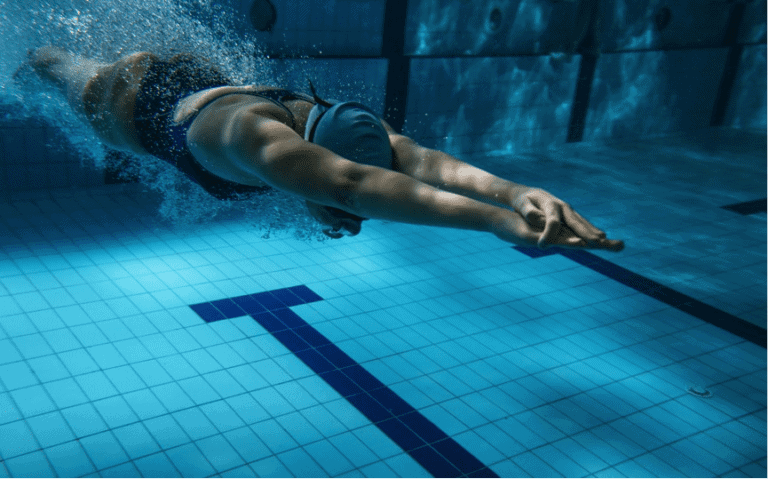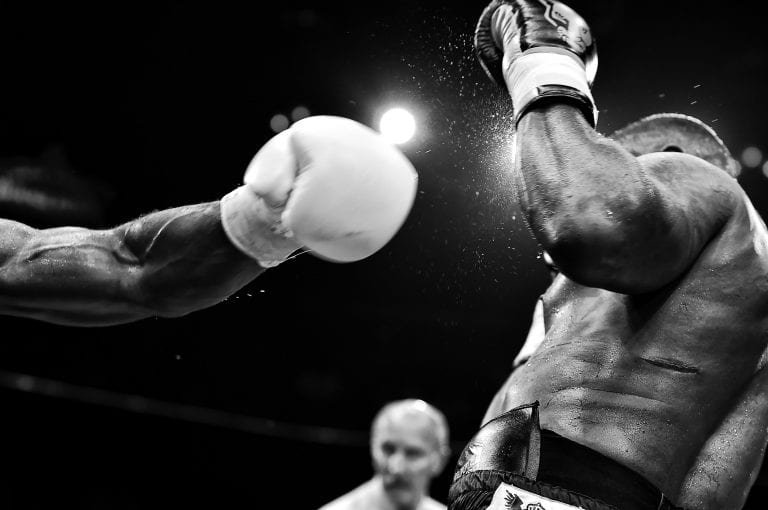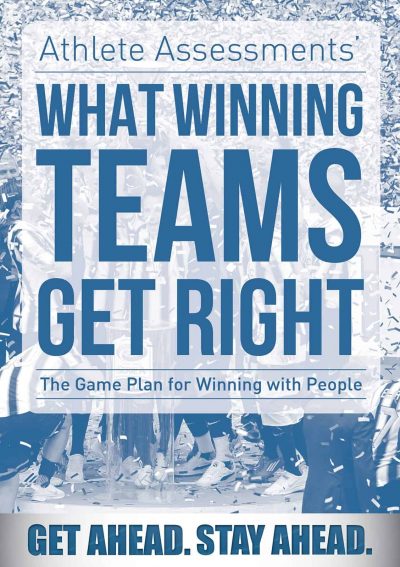By Dr Tony Alessandra (Alessandra & Associates) and Bo Hanson (Coaching Consultant and Director of Athlete Assessments)
On this page we provide you with an introduction to the background and basic principles behind the DISC theory used in all Athlete Assessments profiles. You can use this basic understanding of the DISC theory to identify the styles in those around you and how best to work with different people. Please note this is a basic overview, for the most impactful improvement we recommend you take advantage of our DISC Profile Assessments.
We have a whole category filled with articles about DISC and its Theory and Application in Sport. Find out the importance of Profiling in Sport and how DISC can be used to look at Conflict and Team Dynamics in your program. Read about DISC Theory and Application Now!
Athlete Assessments has three unique, sports behavioral profiling products: AthleteDISC for athletes, CoachDISC for coaches and Sport ManagerDISC for team managers, sports administrators and other sports professionals. These leading edge products are the only specific behavioral profiling products for athletes, coaches and sports professionals available in the world today.
The AthleteDISC, CoachDISC and Sports ManagerDISC model measures four areas of behavior and uses the letters D, I, S, C to describe this behavior. D is for Dominance, I is for Influence, S is for Steadiness and C is for Conscientious. Briefly, here are some core behaviors of each letter (style). You may have even noticed some of these behaviors in yourself or the athletes you coach.
Dominance (D): are faster-paced (movement, talking, deciding) more direct (to the point), task/goal -orientated (want to win) and personally more guarded (do not disclose personal information readily).
Influence (I): are faster-paced (movement, talking, deciding), more direct (to the point), people -orientated (seek out and enjoy the company of others) and personally more open (disclose personal information readily).
Steadiness (S): are slower-paced (slower to move, talk and respond), more indirect (take time to get to the point and gives detailed information), relationship -orientated (want to get to know you) and personally more open (will disclose personal information).
Conscientious (C): are slower-paced (slower to move, talk and respond), more indirect (take time to get to the point and gives detailed information), task/goal -orientated (wants to do things the right way first time) and personally more guarded (do not disclose personal information readily).
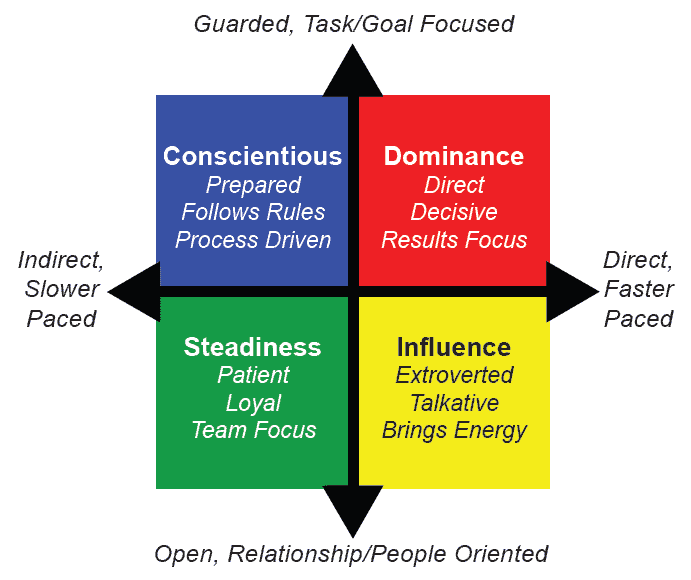
So, how do you quickly and accurately identify each of the four behavioral styles in order to practice adaptability? You do this by firstly focusing on the areas of behavior – directness and openness.
So, to quickly identify the styles of other people ask these two questions:
- Are they more direct and fast-paced or indirect and slower-paced?
- Are they more guarded and task--orientated or open and people--orientated?
Direct and Fast-Paced or Indirect and Slower-Paced
DIRECT/FASTER-PACED PEOPLE (D AND I STYLES RIGHT OF THE VERTICAL LINE)
Behaviors
- Frequently uses gestures and voice intonation to emphasize points
- Less patient; more competitive
- Often makes emphatic, generalized statements
- Sustained eye contact
- Frequent contributor in the team
- Obvious and strong body language or gestures
- Expresses opinions readily and openly
- More likely to introduce self to others
INDIRECT/SLOWER-PACED PEOPLE (S AND C STYLES LEFT OF THE VERTICAL LINE)
Behaviors
- Infrequent use of gestures and voice intonation to emphasize points
- More patient and cooperative
- Often makes qualified, well-structured statements
- Subtle body language or gestures
- Infrequent but profound contributor in the team
- More likely to wait for others to introduce themselves
- Reserves expression of opinions
Guarded and Task--orientated or Open and People--orientated
OPEN/PEOPLE--orientated PEOPLE (I AND S STYLES BELOW THE HORIZONTAL LINE)
Behaviors
- Shows feelings and enthusiasm freely
- More relaxed and warm
- Emphasizes main ideas
- Goes with the flow
- Conversation can wander in team meetings
- Opinion--orientated
- Animated facial expressions
- Easy to get to know
- Friendly body language or gestures
- Initiates/accepts physical contact
GUARDED/TASK--orientated PEOPLE (D AND C STYLES ABOVE THE HORIZONTAL LINE)
Behaviors
- Keeps feelings private
- Limited range of facial expressions
- More formal and proper
- Avoids/minimizes physical contact
- Goes with the suggested program
- Speaks in specifics; cites facts and examples
- Formal body language or gestures
- Conversation stays on subject
The Whole Picture
The Four Basic Behavioral Styles Overview
When you combine both scales, you create each of the four different DISC behavioral styles. Individuals who exhibit guarded and direct behaviors are Dominance Styles; direct and open behaviors are Influence Styles; open and indirect behaviors are Steadiness Styles; and indirect and guarded behaviors are Conscientious Styles.
Below is a chart to help you understand some of the characteristics of each of the four basic styles, so you can interact with each style more effectively. Although behavioral style is only a partial description of personality, it is quite useful in describing how a person behaves, and is perceived in the sporting environment.
(If you are interested in understanding more about how you can use DISC Profiling to improve your performance and interactions with other styles of people, please see our new and improved DISC Profile Reports.)
Discover more information about the AthleteDISC profile for athletes, CoachDISC profile for Coaches and/or the Sports ManagerDISC profile for other sports professionals. Or contact us to find out how we can help you further develop your coaching.
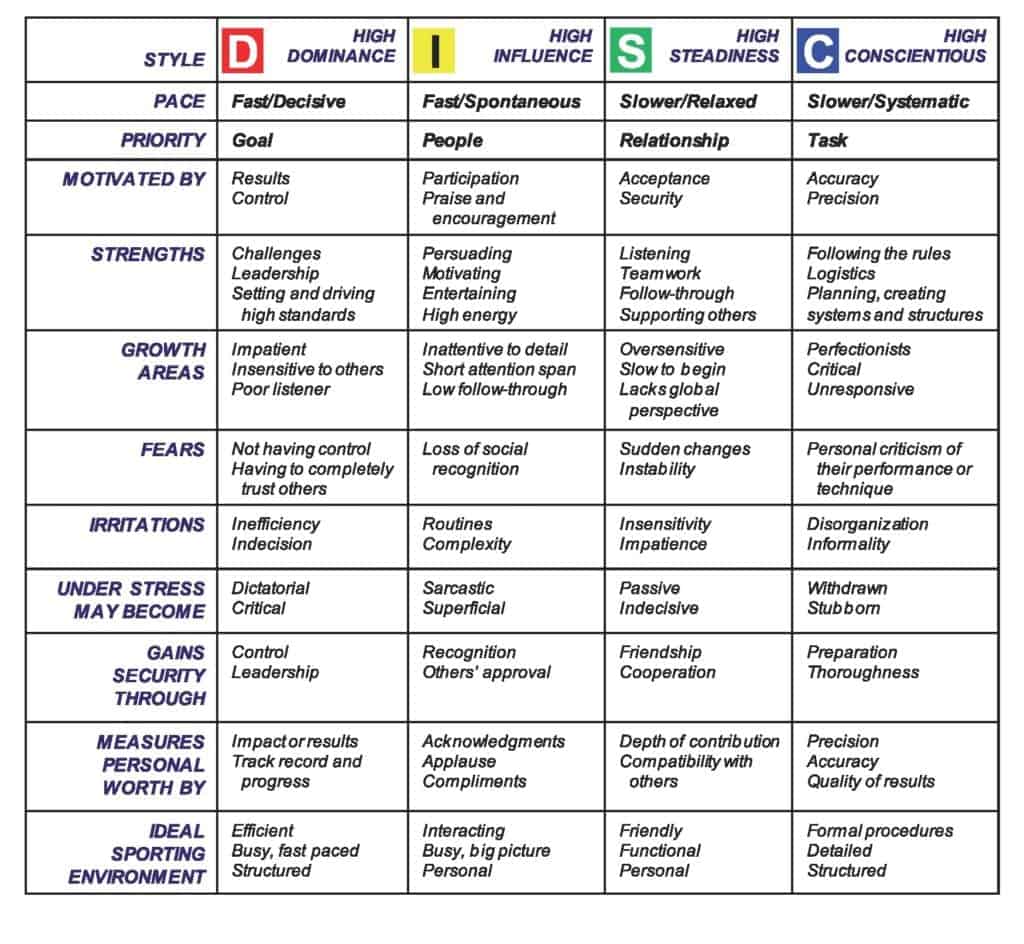
Where to from here?
The sporting arena is one of the most demanding and competitive environments. To be the best, you need the best resources and to prioritize your most important asset, people. Athlete Assessments specializes in helping you, your team and your clients realize their full potential through the use of our sport specific DISC Profiling.
At Athlete Assessments we’re here to provide you with excellence in service and to help you be your best. If there is anything we can do to contribute to your success, please contact us.
Recommended Articles
As we all know, our personality impacts our behavior and as such has a direct impact on our coaching style. However, unlike personality, which is relatively stable, a coach’s style is a preferred pattern of behavior and as such it can be changed or adapted depending on the situation. Most of all though, a coach’s style can be changed or adapted if they are aware of their style preference and what style will give them the results they need.
Dr LaTisha Bader, Certified Mental Performance Consultant on using Athlete Assessments’ DISC Profiling to develop self-awareness and team chemistry.
Every time an athlete, coach or team strives to better their performance, they analyze themselves in action, identify areas to improve upon and make plans for change...
Which “Four Letter Word” is More Useful in Sport? While there is a little humor in the title of this article, at Athlete Assessments we believe it’s always best to share knowledge. We are regularly asked about the different types of profiling, assessments, and other development tools available in sport (and business) and how they compare to our own use of the DISC Assessment. Most commonly, we are asked to compare MBTI and DISC.
The most critical element in choosing a tool for self-development is to assess what outcome you are trying to achieve. We are regularly asked about the different types of profiling, assessments and other development tools available…


